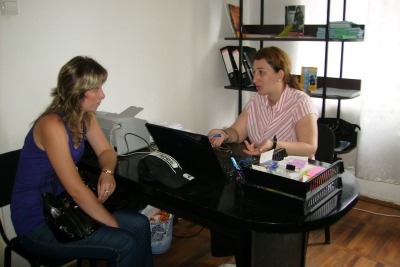Access to Justice for Internally Displaced Persons
Date:
Since 2010, more than 28,000 internally displaced persons (IDPs) throughout Georgia have benefited from free legal advice on matters such as access to housing and land, social benefits and livelihood opportunities.

Legal consultation in the Kutaisi regional branch of the MRA; Photo: UN Women
According to the MRA, approximately 250,000 people are internally displaced in Georgia. Most people have been displaced for over two decades, and many continue to face challenges in accessing viable accommodation and employment. Tea Tedliashvili is one of the lawyers who has been working since 2010 in Gori, Shida Kartli region, to improve the access of IDPs to information and justice, with a particular focus on women beneficiaries. She reports that:
“Initially, most of the referrals were related to granting IDP status, especially for those displaced by the war in 2008. Other common issues were family disputes, alimony and divorce. These issues are still present but now accommodation, space legalization and property rights prevail among referrals, which have clear links to livelihoods.”
In addition to legal consultations, the lawyers from the legal clinics have organized information meetings in IDP communities for more than 42,000 people (the majority being women), providing updates about accommodation processes and information about property rights, social security issues and women’s rights. The lawyers have also provided court representation for more than 1,000 individuals. Tea Tedliashvili explained the significance of the legal clinics:
“For many IDPs, their economic and social conditions do not allow them to access costly services, especially court representation. The free legal advice and outreach information has helped many people to resolve legal issues, and with time, we have also seen that the situation in regards to access to justice and information overall has improved in many IDP communities as a result of our work. The need for consultations is slowly decreasing because people have more information.”
The first legal clinics were established with the support of the Government of Norway in 2010, and since February 2016, these services have been one of the components of the EU-funded project “Equal Access of IDPs to Economic Opportunities”, implemented jointly by UN Women and the Food and Agriculture Organization of the United Nations (FA0).
This latter project is part of the IDP IV programme, under which the EU and the MRA have set ambitious objectives to advance the socioeconomic integration of IDPs and conflicted-affected persons. The MRA has agreed to institutionalize the legal aid services by mid-2017.